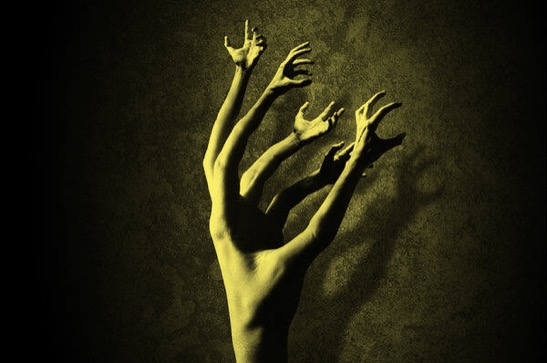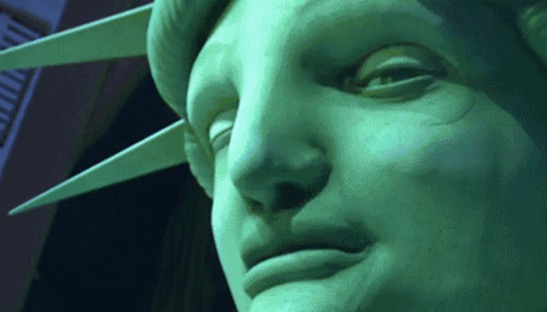No invisible hand guides the hearts of the people.
Too Many Hands

Disillusioned liberalism can pull us from the hellbroth of clashing absolutists.
In a 2002 speech at London’s prestigious Lancaster House, then-Chair of the US Federal Reserve Alan Greenspan remarked upon the recent growth in global finance:
We strongly suspect, though we do not know for sure, that the accelerating expansion of global finance may be indispensable to the continued rapid growth in world trade in goods and services.… Especially important in the United States has been the flexibility and size of the secondary mortgage market.… As the market for credit default swaps expands and deepens, the collective knowledge held by market participants is exactly reflected in the prices of these derivative instruments.
Greenspan reiterated his conviction in the power of an “international invisible hand” to “spread,” “disperse,” and “distribute” risk to ever more efficient heights in his 2007 memoir, The Age Of Turbulence. With the ink barely dry, we know what happened next. Mortgage derivatives like credit default swaps became ground zero for an unprecedented financial crisis, provoking a catastrophic recession that reverberated across the United States and throughout the world economy.
The Great Recession caused lasting damage, not least to the reputations of free market fundamentalists such as Greenspan. It further illustrated what, in an essay for American Affairs, Harvard Law School professor Adrian Vermeule dubbed liberal fideism, or the quasi-theological belief in the “invisible hand” of the market to produce system-level social goods.
“Liberalism’s faith in its suite of invisible hand accounts greatly outruns any of the mechanisms or evidence supporting them,” writes Vermeule. Greenspan, for example, adopts the Hayekian rhetoric of markets as aggregators of “collective knowledge” toward the end of efficient social coordination. Vermeule views this framework as strictly unverifiable, as became evident when supposedly AAA-rated mortgage-backed securities turned out to be junk. The market updated to this new knowledge by rendering highly leveraged assets worthless, sparking a de-facto bank run. If anything, the mortgage market revealed itself to be sustained by a kind of collective ignorance, while the discovery of the “correct” prices produced mass social discoordination.
Vermeule does not cite the financial crisis in his essay; the example is my own. However, as a case study in self-regulatory hubris, it helps make Vermeule’s argument more concrete. It also reveals the limits of his otherwise sweeping rejection of liberalism.
Market Failure
Markets can fail, often disastrously so. But they also succeed on a daily basis, as shown in the immense wealth of market-friendly nations, and in the unfathomable level of impersonal coordination required to produce virtually all the goods and services we consume. Indeed, markets succeed so regularly that we take it for granted, making cases of abject failure all the more salient. Belief in markets does not require faith; the evidence that markets can work is there for all those willing to look.
Emphasis on the word can. What distinguishes an empirically warranted trust in markets from the fundamentalist’s faith is, ultimately, respect for the radical contingency of the social world. Progress proceeds, until it doesn’t. Civilizations are stable, until they collapse. Markets work, until they don’t. Economists who treat their models as complete descriptions of the world can end up confusing the map for the territory, and in so doing conflate what is with what has to be.
The philosopher Joseph Heath calls a version of this blind spot catallactic bias, in reference to the term “catallaxy” used by Hayek to describe the spontaneous market order. Specifically, Heath defines catallactic bias as “a habit of mind that involves assimilating all cooperative benefits to the model of gains from trade.” Specialization and the gains from trade are important, enabling an apple grower to sell his surplus to purchase oranges. But focusing too narrowly on mutually beneficial exchange can end up overlooking other important forms of cooperation, including risk-pooling. In a hunter-gatherer society, for example, the chance of an individual hunter capturing an animal for food can vary significantly day by day. Such a society may therefore develop a norm of food sharing, in which cooperative benefits are generated by taking advantage of the law of large numbers. Where common risks exist, pooling can often achieve efficiencies that are impossible through pairwise trades alone.
In the lead up to the 2008 financial crisis, market fundamentalists like Greenspan believed securitization was reducing systemic risk through the gains from trade between risk averse and risk neutral investors. “But if instead one sees many of these transactions as involving the ‘pooling’ of a risk, then a dramatic increase in volume may look rather more worrisome,” notes Heath. The entire concept of “risk management” thus becomes “something of a misnomer, since the risk never goes away, it just gets pushed around, like a bump under the carpet.”
Catallactic bias is an endemic feature of liberalism as “an operating sociopolitical regime,” as Vermeule would put it. The “neoliberal” heyday of the 1990s and early 2000s, for instance, saw a wave of demutualizations, as customer-owned mutual organizations (like insurance cooperatives) were converted into joint-stock corporations. The fad culminated in George W. Bush’s attempt to partially privatize Social Security, then backed by liberal fideists at the Cato Institute and Club for Growth. The plan would have diverted worker’s payroll tax contributions into private accounts for investment in stocks, bonds, and mutual funds, substituting the risk pooling protection against outliving one’s savings for a “gains from trade” benefit derived from individualized investment returns.
Critical Theory
Unfortunately, Vermeule appears unaware of (or at least doesn’t cite) theorists like Heath, nor the seminal works of sociology that make many of his same points, but decades earlier and with far greater conceptual clarity. Consider Vermeule’s claim that “in important cases, the liberal invisible hand is self-undermining,” whether through the depletion of pre-liberal social capital, or the “public choice problem” created by self-interested agents that game the political system. To understand either mechanism, Jürgen Habermas’s magnum opus, The Theory of Communicative Action, is required reading. Building on the theories of Max Weber and Émile Durkheim, Habermas argues that modern societies are vulnerable to a rationalization process whereby scalable systems of social coordination like markets and bureaucracies colonize local, norm-governed forms of social coordination, thus dismantling traditional forms of life.
Habermas goes on to argue that the adoption of purely instrumental, means-ends modes of reasoning (to the exclusion of communicative, norm-governed reason) can also be self-undermining. For example, given that a market can never be perfectly regulated, an efficient market outcome depends on some level of “play fair” between businesses. Firms should seek profits by competing on price and quality rather than by, say, polluting rivers or seeking political favors. The libertarian notion that the sole responsibility of a business is to maximize profits (a purely instrumental view) thus supplies a kind of cognitive license to play dirty. This causes a breakdown of implicit business norms that must then be replaced by explicit regulations, leading to the phenomenon of ever-expanding legal codes (what sociologists call “juridification”).
A similar normative breakdown has arguably undermined the smooth operation of Congress since (at least) the Gingrich era. As Vermeule himself notes, the rules of any political system are never fully specified; they depend on a litany of unwritten norms. That leaves political competitions vulnerable to their own form of instrumentalization, in which “winning the game” at all costs begins a process of mutual subversion and defection. Vermeule may take this as an indictment of the liberal faith in “checks and balances” to produce harmony between warring factions. But not only is this dynamic possible in any cooperative game; if anything, it is exacerbated by a Schmittian realism about defeating one’s enemies. The illiberal and uncompromising actor is thus the prime mover of normative decay.
Literally thousands of articles have been written reacting to and building on Habermas’s theory, which is meant to describe a dynamic common to modernity (not just Western, liberal societies). Vermeule should read them. Until then, the grains of truth in Vermeule’s broadside against liberalism are too underdeveloped and abstruse to do much with. The invisible hand of the market is simply construed as a secularized stand-in for Providence, and liberalism its politico-theological counterpart. This all but rules out the possibility of piercing the veil; of understanding not just that the liberal fideists are wrong, but why and what we can do about it.
Whose Telos?
A motivating factor behind Vermeule’s wholesale rejection of the invisible hand appears to be the traditional Catholic view on telos. Teleology relates to the design, purpose, or finality of a system or phenomenon. Catholic philosophers reject materialist explanations of consciousness, for example, on the basis that the cause and effect of molecules and neurons interacting in the brain cannot possibly add up to the intentional and purposive character of the human mind. Analogously, Vermeule rejects the idea that an aggregation of market actors, motivated by private interests, can mechanically add up to a system-level outcome that reflects the telos of his theological ideal.
In this light, it’s easy to see the source of Vermeule’s unease with liberal parables, from Mandeville’s Fable of the Bees to Robert Wright’s paean to globalization, Nonzero. The Whiggish view of the free market as trending toward ever greater social welfare is, in a sense, a purely stipulated, secularized telos that substitutes for divine Providence. Wright’s 2009 book, The Evolution of God, goes so far as to conjecture that the pull of “win-win” / “gains from trade” dynamics in history is the best evidence for a transcendent telos in nature, and may thus deserve the title of God.
If that’s not liberal fideism, I don’t know what is.
And yet it is a complete non-sequitur for Vermeule to leap to a literally fideist system—Catholic integralism—as the logical alternative. Thinkers like John Gray have made many similar observations about modern liberalism’s genealogy in Protestantism, for example. But rather use that as an excuse to take communion with an equal and opposite metaphysical creed, Gray adopts a tragic and contingent view of the human condition, applying skepticism to claims of Providence symmetrically, like a mirror to nature. If the world is contingent and non-Providential, that should be reflected in our meta-ethical and political theories.
“Liberalism” itself has manifold interpretations, ranging from Richard Rorty’s pragmatic pluralism to Judith Shklar’s liberalism of fear. Vermeule may be right, in other words, that liberalism as an “operating sociopolitical regime” is akin to a sacramental theology, but that still leaves liberalism’s more fabilist, minimalist, and post-metaphysical variants intact. Indeed, the realization that even progressive atheists are encumbered by quasi-religious belief systems—that “all human conflict is ultimately theological,” as Vermeule has put it elsewhere—may even create the conditions for liberalism’s renewed relevance. That’s assuming, of course, the sectarians among us desire a peaceful settlement in the first place, and are willing to pool their fate rather than merely manage risk, as if awaiting the eventual collapse.
The American Mind presents a range of perspectives. Views are writers’ own and do not necessarily represent those of The Claremont Institute.
The American Mind is a publication of the Claremont Institute, a non-profit 501(c)(3) organization, dedicated to restoring the principles of the American Founding to their rightful, preeminent authority in our national life. Interested in supporting our work? Gifts to the Claremont Institute are tax-deductible.
Life under liberalism is servile, though there is no slavery.
Vermeule's Adam Smith is a straw man.
A different leap of faith could be far more dangerous.
Is liberalism still entitled to give itself a hand?





